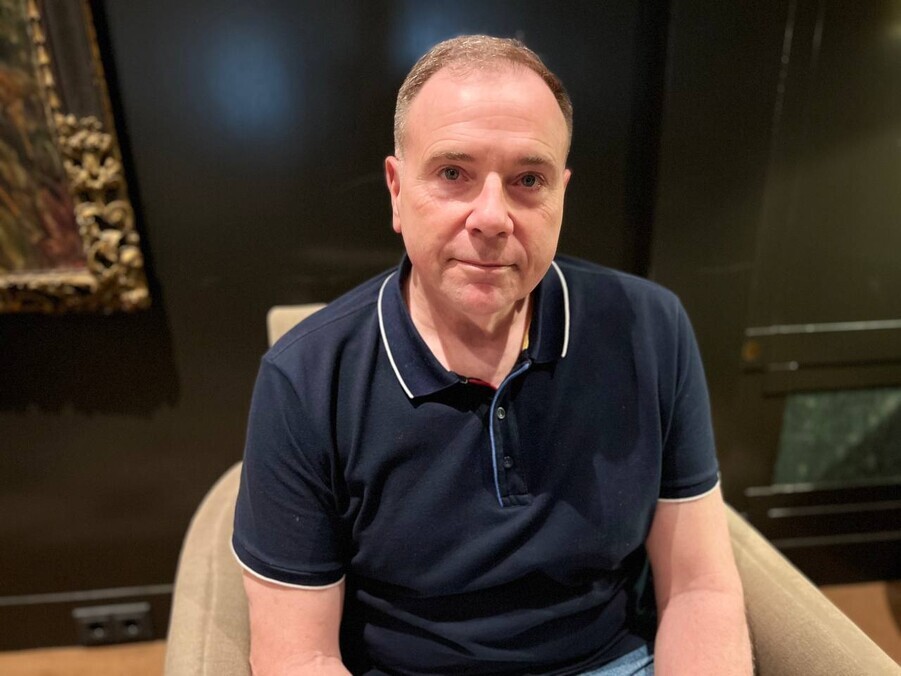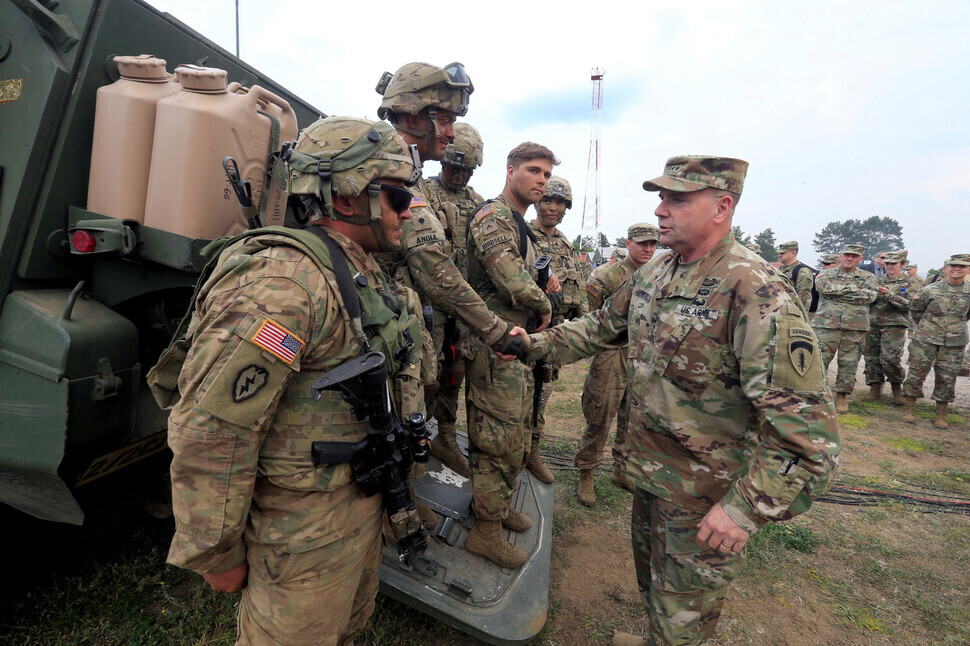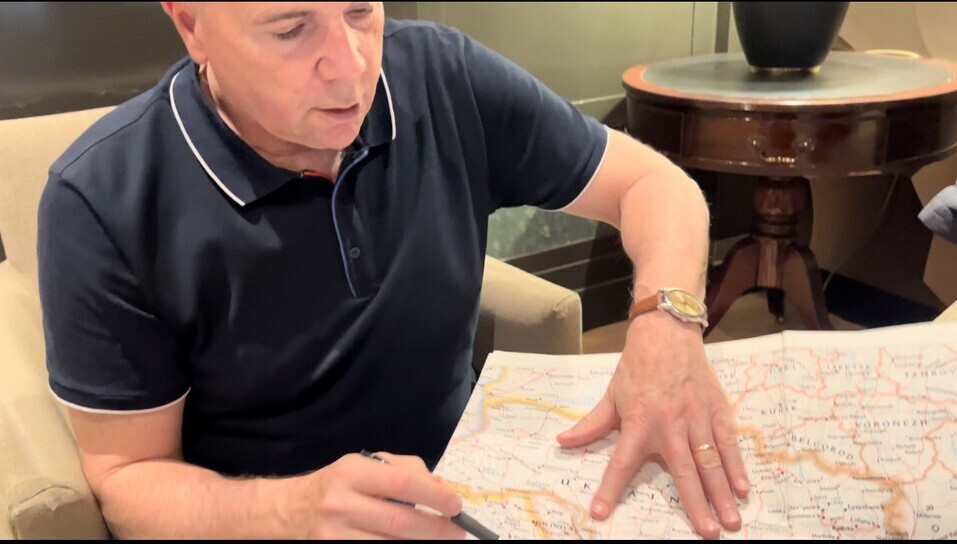hankyoreh
Links to other country sites 다른 나라 사이트 링크
[Interview] Ukraine could begin liberation of Crimea as early as January, says former commander of US Army Europe

As of Thursday, the war in Ukraine that began with Russia’s invasion in February has entered its 10th month. As of the current stage of the war, Ukraine has lost one-sixth of its territory — an area equivalent in size to South Korea — to Russia (105,189 km2 as of Nov. 17). Yet things are looking up compared to the early stages of the war at the end of March and early in April, when Ukraine launched a massive counterattack and Russian forces pulled out of Kyiv (133,179 km2). Ukraine also managed to pull off a strategic feat by recapturing a key position in the country’s southern region represented by the city of Kherson.
What do Western military experts make of the current stage of the war? The Hankyoreh sat down with retired Lt. Gen. Ben Hodges, who formerly served as commander of the NATO Allied Land Command and US Army Europe, to hear his thoughts on where the conflict is at now and what it might look like in the future.
Hodges was serving as commander of the NATO Allied Land Command in March of 2014 when Russia forcibly annexed Crimea and served as commander of US Army Europe until 2017.
The retired lieutenant general expressed optimism, believing that if the United States and others continue their active support, Ukrainian forces could possibly launch a campaign as early as the first few months of 2023 to regain land they lost in 2014, including the Crimean Peninsula and other southern territories. This was a different outlook than that expressed by US military leadership, including US Joint Chiefs of Staff Chairman Mark Milley, that if fighting reaches a stalemate with the coming of war, both sides should step up to the dialogue table.
Hodges: On the psychological level, it’s a huge boost in morale for the Ukrainian people. It’s embarrassing and causing a lot of problems in Moscow that days after they declare the successful annexation of Kherson, they lose the capital of the oblast. At the operational level, if you think about the Ukrainian counteroffensive that started in September, they recaptured Kherson (in the South) and Kharkiv (in the North). Think of these as two wings of the same thing. The “right wing” heads toward Kherson. And the “left wing” to Kharkiv, down through Izium, and toward Mariupol. Eventually, all roads lead to Crimea.
I think by January, February, they can begin the last phase, which is the liberation of Crimea. Ukraine damaged the Kerch Bridge (Crimean Bridge). The Russians have already pulled back behind the Dnipro River. So getting Kherson now makes it more feasible for the “right wing” to come up closer.
Hani: When will the war end, and who do you will come out victorious?Hodges: Ukraine wants to win, there’s no doubt in my mind. I believe it’s possible that they will liberate Crimea by next summer and will thus have restored sovereignty and all their territory by then. That is, if all of us continue to support Ukraine. If we don’t support it with equipment, finances, and if we don’t keep the sanctions in place, then this goes on much, much longer.

Hodges: I was worried a few months ago when some Republicans [in the US] were talking openly about cutting more support [for Ukraine]. Never in my life did I imagine that the Republican Party would be using Kremlin talking points. That’s Trump and some of his acolytes. Fortunately, most of them were defeated in the midterms. It’s interesting to note that Russia gets drones from Iran and winter clothing from North Korea. I mean, how bad is it in Russia that they resort to that? And also, war is a test of will. And it’s obvious that the Ukrainian people and Ukrainian soldiers have the superior will.
Hani: On Nov. 15, a missile fell on Poland, a NATO member, sparking fears of a rapidly expanding war. But within two hours of the news breaking, you posted on your Twitter: “My sense is this is not an intentional Russian attack. Either a malfunction or the results of Ukrainians shooting down a Russian missile.” What did you base that judgment on?Hodges: First of all, it seemed so unlikely that Russia would intentionally do that. If they were going to do something like that, it could be easily discovered, and it would risk being seen as an attack on a NATO country and an EU country. There would have to be something worthwhile, such as a base in Poland where all the equipment’s going, [for them to choose to do so]. So that didn’t make sense.
Secondly, it was more plausible to me that this was the result of somebody’s mistake. Then I just happened to see a video of another cruise missile [presumably shot by Russia] being intercepted [by Ukraine]. And when it hit the missile, the missile didn’t disappear. It was still a big chunk. And it kept going. That scenario seemed much more plausible to me.
Hani: Initially, many thought the Polish government would ask for a mutual consultation based on Article 4 of the NATO treaty, but the NATO secretary-general said Poland did not make such a request. What does this mean?Hodges: To formally invoke Article 4 could be seen as some sort of escalation, maybe. It’s been invoked just seven times since NATO’s establishment in 1949. I imagine that there were a lot of phone calls going on and they may have already figured out the situation early on.
Hani: The situation meant that Article 5 of the NATO treaty could have also been invoked. Would that have meant the start of World War III?Hodge: Not necessarily. Article 5 has been invoked one time in history: after 9/11. And that didn’t turn into World War III. Article 5 says an armed attack — not an attack, but an armed attack — on one shall be considered an armed attack on all. The key is that any adversary or potential adversary believes that if we attack Lithuania, we attack Poland, or if we attack Turkey, everybody else is coming. Article 5 tells adversaries that a conflict with Slovakia will end up turning into one with the US and Poland and Germany and UK all showing up. That’s why it’s so significant. And it’s also why it was so important and dangerous.

Hodges: According to the information that has been released, the Polish military did indeed detect where it came from. But your question actually highlights part of the challenge. These missiles are flying at extremely high speeds and so you only have seconds to react. It’s not like an intercontinental ballistic missile, where you might have a few minutes. It takes a lot of sensors to effectively detect, and then somebody has to make a decision. This is something that needs to be exercised a lot. And we have not exercised enough, in my view.
Hani: Ukraine has claimed that the missile that fell on Poland was caused by Russia.Hodges: Ukraine has already begun to back down on this a little bit. This is maybe the first time in nine months that there’s been what you might call a strategic communications error [on the Ukrainians’ part].
Hani: How would NATO react if a missile Russia was trying to fire on Ukraine accidentally went into Poland?Hodges: I think we saw that, if it turned out that they were able to confirm that it was, in fact, a deliberate Russian shot that either missed its target in Ukraine and landed in Poland, or the Russians intentionally did this, it would not necessarily have to result in some sort of escalation. But what I do hope will happen is that everybody would condemn the Kremlin. First of all, why are you shooting a missile so close to the border of a NATO country? What is it you’re trying to accomplish here? Russia would be escalating the risk.
Secondly, what I would expect is that this would remove obstacles to providing more capability to Ukraine, such as the ATACMS [Army Tactical Missile System], a 300-kilometer range weapon, that’s also fired from HIMARS [High Mobility Artillery Rocket System], but it has a much greater range. Doing so would help Ukrainians hit targets inside Crimea, for example, 300 kilometers away from Odesa.
Hani: Do you think the United States and Europe should support additional air defense systems in Ukraine in the future?Hodges: I assume it’s possible. And I wish they would have done that eight months ago. The problem is that even the US has a very limited Patriot system. There’s only one US battalion with Patriot in all of Europe. We have a lot sitting in Saudi Arabia.
To me, it’s worth looking at priorities. Where do we put our limited resources? I think this has been a little bit of a wake-up call for everybody. I personally, was a little bit doubtful that the Russians, in the year 2022, would launch missiles directly at civilian targets — apartment buildings, shopping centers, hospitals, an opera house. What that means is that our requirements are so much more than what we thought: it’s needed to protect hundreds of millions of European citizens.
By Noh Ji-won, Berlin correspondent
Please direct questions or comments to [english@hani.co.kr]

Editorial・opinion
![[Guest essay] The real reason Korea’s new right wants to dub Rhee a founding father [Guest essay] The real reason Korea’s new right wants to dub Rhee a founding father](https://flexible.img.hani.co.kr/flexible/normal/500/300/imgdb/original/2024/0423/8317138574257878.jpg) [Guest essay] The real reason Korea’s new right wants to dub Rhee a founding father
[Guest essay] The real reason Korea’s new right wants to dub Rhee a founding father![[Column] ‘Choson’: Is it time we start referring to N. Korea in its own terms? [Column] ‘Choson’: Is it time we start referring to N. Korea in its own terms?](https://flexible.img.hani.co.kr/flexible/normal/500/300/imgdb/original/2024/0423/3617138579390322.jpg) [Column] ‘Choson’: Is it time we start referring to N. Korea in its own terms?
[Column] ‘Choson’: Is it time we start referring to N. Korea in its own terms?- [Editorial] Japan’s rewriting of history with Korea has gone too far
- [Column] The president’s questionable capacity for dialogue
- [Column] Are chaebol firms just pizza pies for families to divvy up as they please?
- [Column] Has Korea, too, crossed the Rubicon on China?
- [Correspondent’s column] In Japan’s alliance with US, echoes of its past alliances with UK
- [Editorial] Does Yoon think the Korean public is wrong?
- [Editorial] As it bolsters its alliance with US, Japan must be accountable for past
- [Guest essay] Amending the Constitution is Yoon’s key to leaving office in public’s good graces
Most viewed articles
- 1[Column] ‘Choson’: Is it time we start referring to N. Korea in its own terms?
- 2Senior doctors cut hours, prepare to resign as government refuses to scrap medical reform plan
- 3Why Korea shouldn’t welcome Japan’s newly beefed up defense cooperation with US
- 4Opposition calls Yoon’s chief of staff appointment a ‘slap in the face’
- 5[Guest essay] The real reason Korea’s new right wants to dub Rhee a founding father
- 6Terry Anderson, AP reporter who informed world of massacre in Gwangju, dies at 76
- 7[Column] The clock is ticking for Korea’s first lady
- 8[Editorial] Japan’s rewriting of history with Korea has gone too far
- 9New AI-based translation tools make their way into everyday life in Korea
- 10Survey: S. Koreans spend more time using smartphones than eating